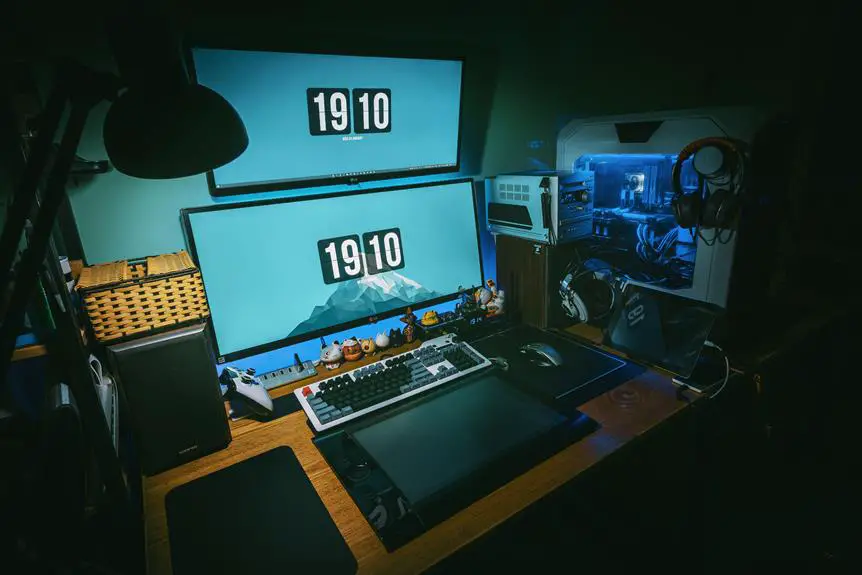In the realm of computing, discerning the similarities and disparities between a gaming PC and a regular PC is paramount for individuals seeking to make a well-informed purchase decision.
These two types of PCs offer an array of customization options, ranging from hardware choices to software configurations.
Both share common peripherals and accessories, and rely on internet connectivity for optimal performance.
Furthermore, gaming PCs possess the versatility to run productivity software while delivering an immersive gaming experience.
Understanding these distinctions aids in selecting the ideal PC that aligns with specific requirements.
Customization and Personalization
There are numerous customization options available for both gaming PCs and regular PCs, allowing users to personalize their systems according to their preferences.
One popular customization feature is RGB lighting options, which provide users with the ability to choose from a wide range of colors and lighting effects to create a visually stunning setup.
Additionally, custom case designs are another way to personalize a PC. Users can select unique and stylish cases that reflect their individual taste and style.
These customization options give users the freedom to create a PC that not only performs well but also looks great.
Whether it's a gaming PC or a regular PC, customization plays a significant role in allowing users to express their creativity and individuality.
Operating System
Both gaming PCs and regular PCs typically run on a single operating system, providing users with a unified computing experience. The operating system serves as the user interface, managing hardware resources and facilitating software compatibility. This allows users to have a consistent core computing experience regardless of the type of PC they are using.
However, there are pros and cons to consider when it comes to the operating system. On one hand, a unified operating system simplifies software installation and updates, making it easier for users to manage their PCs. On the other hand, it may limit the customization options for advanced users who prefer different user interfaces or want to experiment with different operating systems.
Overall, the operating system plays a crucial role in both gaming and regular PCs, providing a foundation for the user experience.
Peripherals and Accessories
A wide range of peripherals and accessories, including keyboards, mice, monitors, and external storage devices, are available for users to enhance their gaming or regular PC experience.
Peripheral compatibility: Peripherals such as keyboards and mice are compatible with both gaming and regular PCs, allowing users to easily switch between the two.
Gaming specific accessories: There are accessories specifically designed for gaming PCs, such as gaming keyboards with programmable keys and RGB lighting, gaming mice with adjustable DPI settings, gaming monitors with high refresh rates and low response times, and gaming headsets with surround sound capabilities.
These accessories cater to the specific needs and preferences of gamers, providing them with an immersive and competitive gaming experience. However, it's important to note that many of these gaming specific accessories can also be used with regular PCs, offering enhanced functionality and aesthetics.
Ultimately, the choice of peripherals and accessories depends on individual preferences and use cases, regardless of whether it's for gaming or regular PC usage.
Internet Connectivity
Internet connectivity plays a crucial role in facilitating access to online resources and enabling seamless communication for both gaming PCs and regular PCs. Whether it's browsing the web, downloading files, or engaging in online gaming, a stable and reliable internet connection is essential.
When it comes to internet connectivity options, both Wi-Fi and Ethernet connections are available for users to choose from. Wi-Fi provides the convenience of wireless connectivity, allowing users to connect to the internet from anywhere within the network range.
On the other hand, Ethernet connections offer a more stable and faster connection, especially for online gaming. For a better online gaming experience, Ethernet connections are often recommended due to their lower latency and higher bandwidth compared to Wi-Fi.
However, the choice between Wi-Fi and Ethernet ultimately depends on the user's specific needs and preferences.
Productivity Software
Productivity software applications, such as Microsoft Office Suite and Adobe Creative Cloud, enhance the functionality of both gaming PCs and regular PCs for various tasks, including word processing, data analysis, graphic design, and content creation. These software applications provide a range of features and tools that allow users to work efficiently and effectively.
- Software compatibility: Both gaming PCs and regular PCs can run productivity software applications, ensuring that users have access to the same tools and capabilities.
- Versatility for work: Gaming PCs, despite being optimized for gaming performance, can also serve as capable workstations. They offer the power and performance required for resource-intensive tasks, making them suitable for professionals in fields such as graphic design and video editing.
- Customization options: Users have the freedom to install and configure productivity software according to their preferences.
- Seamless integration: Productivity software seamlessly integrates with the operating system of both gaming PCs and regular PCs, providing a consistent computing experience.
Overall, gaming PCs and regular PCs offer software compatibility and versatility for work, allowing users to maximize their productivity and freedom.
Performance and Hardware
The performance and hardware capabilities of gaming PCs and regular PCs are crucial factors to consider when determining the suitability of these systems for specific use cases.
Gaming PCs are typically designed with higher-end components to meet the demands of graphically intensive games, while regular PCs are built for general tasks such as web browsing, word processing, and multimedia consumption.
However, it is important to note that regular PCs can be upgraded to enhance their gaming performance and optimization. Upgrades such as adding a dedicated graphics card, increasing RAM capacity, and installing an SSD can significantly improve gaming performance on a regular PC.
Additionally, compatibility is an essential aspect to consider when upgrading hardware components, as not all components may be compatible with a particular system.
Overall, understanding the performance and hardware capabilities of gaming PCs and regular PCs allows individuals to make informed decisions based on their specific needs and preferences.
Gaming Experience and Graphics
When discussing gaming experience and graphics, it's important to consider how advancements in technology have led to immersive gameplay and stunning visual effects.
- Upgrades and system requirements: As technology progresses, gaming PCs allow for upgrades to enhance performance and meet the demands of newer games. System requirements determine the minimum specifications needed to run games smoothly.
- Gaming peripherals and accessories: To enhance the gaming experience, players can invest in gaming peripherals such as high-quality keyboards, mice, and headsets. These accessories offer better precision and comfort during gameplay.
- Immersive gameplay: Modern gaming PCs provide high frame rates and smooth gameplay, allowing players to feel fully immersed in their gaming worlds.
- Stunning visual effects: With powerful graphics cards and advanced visual technologies, gaming PCs can deliver breathtaking graphics and realistic details, enhancing the overall gaming experience.
Overall, advancements in technology have greatly contributed to the gaming experience, allowing for upgrades, improved system requirements, and the use of gaming peripherals and accessories to create a more immersive and visually stunning gaming environment.
Frequently Asked Questions
What Are the Main Differences Between a Gaming PC and a Regular PC in Terms of Performance and Hardware?
In terms of performance and hardware, the main differences between a gaming PC and a regular PC lie in specialized components such as high-end graphics cards, faster processors, and increased RAM capacity for optimal gaming experience.
Can a Regular PC Be Upgraded to Become a Gaming PC?
Yes, a regular PC can be upgraded to become a gaming PC to a certain extent. However, there may be limitations due to the hardware requirements of gaming, such as the need for a powerful graphics card and sufficient RAM.
Are There Any Limitations or Restrictions on the Customization Options for Gaming Pcs?
Customization options for gaming PCs are extensive, allowing users to personalize their systems for optimal gaming performance. However, potential limitations or restrictions may arise depending on hardware compatibility or budget constraints. Expanding gaming capabilities requires careful consideration and optimization.
Are There Any Specific Operating System Requirements for Gaming Pcs?
Different types of operating systems are suitable for gaming PCs, depending on the user's preferences and the specific requirements of popular games. Some games may require specific operating systems for optimal performance and compatibility.
What Are the Recommended Specifications for a Gaming PC in Order to Have a Smooth Gaming Experience?
To have a smooth gaming experience, it is recommended to have a gaming PC with high specifications. This includes a powerful processor, ample RAM, a dedicated graphics card, and sufficient storage capacity.
Conclusion
In conclusion, understanding the similarities and differences between a gaming PC and a regular PC is crucial for individuals looking to make an informed decision about their computer purchase.
Both types of PCs offer extensive customization options, run on the same operating systems, and share common peripherals and accessories. Additionally, they have the capability to run productivity software applications.
By considering these factors, individuals can choose the right type of PC that meets their specific requirements and preferences.

















































